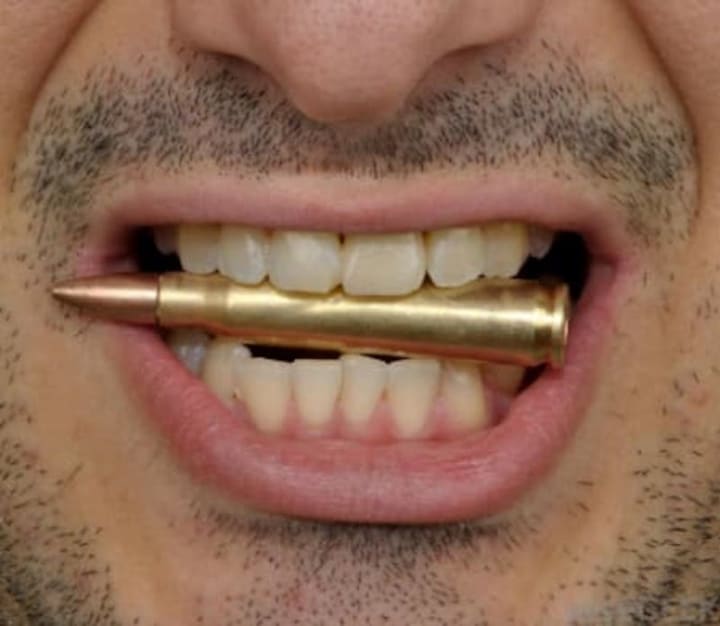"Cat Got Your Tongue?" and 9 Other Idiom Origins
An idiom is a phrase where there is a figurative meaning (rather than a literal meaning) to a grouping of words.

Being a huge movie fan, I know there have been many idioms in movies that have slipped by me without much notice. And with approximately 25,000 idioms in the English language, that's a lot of non-literal words being said. So, while many of us may understand the gist of these phrases (more or less), their historical backgrounds may come as a surprise to you. My goal is to look at some of the more common idioms used in movies and take a look at their historical origins.
Bite the bullet

The first recorded use of the phrase was in the 1891 novel by Rudyard Kipling, "The Light that Failed." It means is to deal with something difficult or unwanted. This is a fairly common phrase, but where did this phrase originate from? In the days when doctors were in battle and short on anesthesia, they would literally have patients bite down on a bullet to help them deal with the pain of amputation (or whatever it was they were going through).
For us introverts, this one can feel like the gif above... Breaking the ice is to begin the work of social interactions. Many have experienced this through awkwardly implemented office or classroom get-to-know-you games (also known as Ice Breakers, ironically), but back when road transportation was not developed, ships were the primary mode of transportation and trade. Often, ships would get stuck in the water in winter months because of the ice. The receiver of these ships would have to send in smaller ships to literally “break the ice” in order for the ships to get to where they were going.
As gross as this sounds, it really only means to flatter someone; however, in ancient India it was a customary religious act to throw butter at statues of gods as a way of seeking favor and forgiveness.
While it would be an easy assumption to make, this one doesn't come from Lewis Caroll’s Alice in Wonderland...
In actuality, this idiom, meaning to be crazy, comes from 17th century France where poisoning often happened due to the mercury in the felt used by hat makers. Signs of this “Mad Hatter Disease” were people acting shy, irritable, and shaking which made the hat wearer look crazy.
This one has a couple of different possibilities for it's origin. One origin story believes that this phrase originates from ancient Egypt where, as a punishment for lying of blaspheming, perpetrators' tongues were cut out and fed to the cats. Another is from when the English Navy would use a whip for flogging called a “Cat-o’-nine-tails", which caused any victim of this flogging to remain quiet for extended periods of time due to the pain. The idiom actually is asked to a person who doesn't have a response to something, so you can understand why both these origin stories are believable.
For this phrase, we head back to the English Navy. One of its heroes, Admiral Horatio Nelson, had a single blind eye. The story goes that it was signaled for him to stop attacking the Danish during a certain watery battle, but he held up a telescope to his blind eye and said, “I do not see the signal.” So, this one, more aptly understood, means to ignore and allow something to happen.
Perhaps one of the most literal idioms, this phrase dates back to early times in North America. The Puritans were in understandable conflict with Native Americans, but while negotiating peace the Native Americans would bury their weapons making them unreachable. Hence, the meaning, to stop conflict or make peace.
This one is a surprise! Figuratively, this means don’t get rid of all of the things of value when ditching the unnecessary ones. Supposedly, in the early 1500s people only bathed once a year and families would bathe in same water without changing it...
With the adult males bathing first, the family would then go down the line from oldest to youngest. This means that by the time they got to the baby, the water would be pretty disgusting, so mothers had to be careful not to dump out their babies with the bathwater.
While I assumed this was a football metaphor, it actually came about during World War II. Fighter pilots were given with nine yards of ammunition and when they ran out, it meant that they had tried their best at fighting off the target. So, this idiom means the same thing; doing the best with what you have.
This one is not what you might think and, of course, it's another one that started with the Navy.
War ships with cannons fire round iron cannon balls and they try to keep a full supply so they are ready to fire when the need arises. However, being round, they are not the easiest thing to keep on a moving ship. In order to do just that, they stack a pyramid of cannon balls on a metal plate of brass with round indentations to hold the balls in place (this plate is called "the monkey"). BUT--brass contracts faster than iron when it's chilled, so if the temperature dropped too much, those brass indentations would shrink and the iron cannon balls would come right off the monkey. Once you're in the know, 'Cold enough to freeze the balls off a brass monkey' is perhaps the most literal of the bunch.
About the Creator
Zane Sanders
An enneagram 5, prone to absquatulate when around crowds for too long. A lover of family, music, coffee, and Marvel movies, with a heart to help others better understand how to actively engage culture with intelligence and creativity.






Comments
There are no comments for this story
Be the first to respond and start the conversation.